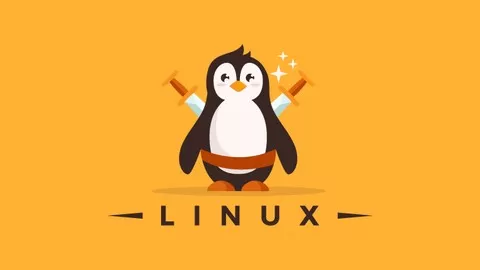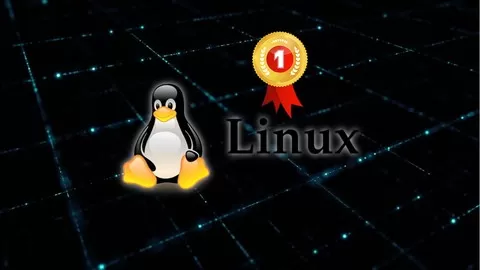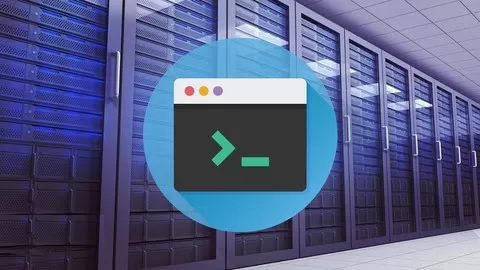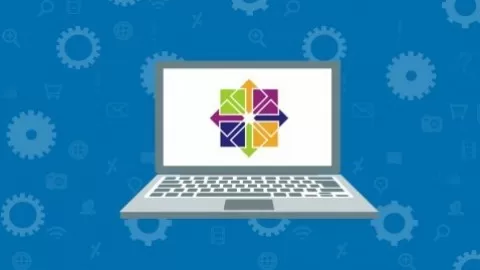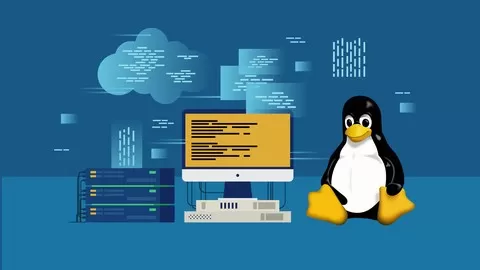•Do you have all the Linux skills to qualify for the job but not getting much luck in the interview?
•Are you starting out a new career in Linux or IT and need help in interview?
•Are you looking for all the tools and tips as to how to ACE technical interview?
If you answer is YES to any of the above questions then you have reached the right course. I will help you guide through how to overcome some technical interview hurdles.
Welcome to the Linux Technical interview Questions and Answers 2020 where you are going to dominate the Linux Technical job interview. Take the course, learn the material and go into technical interview with a confidence that you are prepared!
Get an edge over other candidates that did not take the time to learn technical interview skills.
Become one of my dozens of students that successfully took the course and secured a job.
This course has been expertly crafted to make sure that you rapidly improve your Linux interview skills, Turbocharge your productivity and Boost your career with no time wasting and no useless fluff.
Here is some testimonials from our students:
========================= TESTIMONIALS ===============================
“Very very useful Thanks ” —– Ambadas Bhagat ★★★★★
“I enrolled in this course having some familiarity with Linux but not much. Content was very well presented and documented for beginners and for those who are little bit familiar with the Linux.It covers almost all aspects of Linux. I am fully satisfied. ”
—– Peter Lucic ★★★★★
“Great. This course gives me a lot of knowledge on Linux. It helps my work a lot. Thank you”.
—– Le Hoang Son ★★★★★
—– Michele Berardi ★★★★★
—– Bo Liu ★★★★★
—– Gail Edmondson ★★★★★
—– Pooja Babu ★★★★★
—– Latenis Dent ★★★★★
There is no reason for you to study Linux for months and years and not succeed in securing a job because of a Technical Interview.
Linux system Troubleshooting – Part 1
1- How to view all messages generated by the system since the last reboot on RHEL7/CentOS 7?
2- How to check log messages related to kernel?
3- How can you continuously monitor logs as they come in?
4- Where can you find messages related to the installation of Linux?
5- Where are most of the log files located?
Linux system Troubleshooting – Part 2
Kernel Parameters – Ulimit
6- To improve performance, how can you safely set the limit of processes for the super-user root to be unlimited?
7- Where can you set the resource limits for users logged in via PAM?
8- How to check ulimit for a user?
9- How to check and increase the limit of opened files in Linux?
10- How to view run time kernel parameters?
11- How to change runtime kernel parameter for maximum shared segment size in bytes?
12- How to view Boot time parameters and which file is modified to change these parameters?
Linux system Troubleshooting – Part 3
Troubleshooting with uptime lsof pidof sar and more
13- How to check system load without top command?
14- By default load average is shown in how many intervals?
15- How can you get the physical and virtual memory statistics?
16- How to check cpu utilization and other statistics?
17- How to find process id of a process and kill it immediatley?
18- How to list all open files by specified user?
19- How to list all open files by specified command?
20- How can you list all network connections by port 22?
Advanced Linux system administrations questions and answers:
1- Run a command that shows all lines except any lines starting with the a character “#” in a file?
2- How can you continuously monitor log files for errors?
3- How to automatically remove files older than 7 days by creating a cron job to run every night?
4- How to list/print all created users on the system and send(redirect) them to a file?
5- How would you list only the 2nd column from a file?
6- How to broadcast a message to all logged -in users?
7- How to create a user with no login access?
8- How to schedule a server reboot in 15 minutes?
9- How to find disk usage by the largest directories?
10- How to prevent users from deleting other users files in a directory?
11- How to display 10th line of a file only?
12- Your server got hacked. Due to the amount of damage, the whole server needs to be restored.
How would you go about doing that?
13- What necessary steps should be taken to enhance the security of a server
after the initial install?
14- Which file is the most commonly known to check for log messages?
15- How and why to disable ping?
16- Explain the different fields in /etc/passwd?
17- Which cammand can tell how long the system has been running?
18- How to check if a port is listening?
19- You got a ticket stating server is down, how would you troubleshoot?
20- How to find all files in /bin with specified(755) permissions?
Part 2:
1- What is the default port & configuration file of SSH Server ?
2- How to change the default ssh port in linux ?
3- How to change Maximum allowed sessions through SSH?
4- What is the configuration file of ssh client ?
5- How to disable SSH root login in linux server ?
6- How to allow only specific users to ssh your linux server ?
7- SCP and how its used?
8- How to check SSH server’s Version ?
9- How to setup password less ssh authentication in Linux?
Part 3:
1- How to extend SWAP space?
2- How to extend a logical volume?
3- How to create a logical volume?
4- How to create a volume group?
5- How to create a physical volume after the disk space has been added?
6- Is it possible to increase the logical volume on the fly?
7- How to reduce the logical volume and is it possible to reduce it on the fly?
8-9- How to scan disks for existing volume group and how to scan a logical
volume from existing volume group?
10-11-12-13- How to activate, deactivate, disable/enable a logical volume and a volume group?
How to activated the logical volume which in deactivated state?
How to disable the volume group ? or Deactivate the volume group?
How to enable the volume group ? or Activate the volume group?
14- What is the default size of a physical extent in LVM?
15-16-17-
How to list the available logical, physical volumes and see detailed volume group info on the system?
How to list the available physical volumes in LVM?
How to see the detailed volume group information?
Part 4:
1- How to find files that are over 10MB in size?
2- How would would you run a command that shows all lines containing a character # in a file?
3- How would you display all lines of a file with line numbers?
4- How to find current system information such as the version or release info of your server?
5- Where are the files located for network interfaces?
6- Which command can you run to find if a certain package has been installed?
7- How to find out total lines in a file without opening that file?
8- How to find disk usage by the largest directories?
9- How to find all directories named conf under root?
10- How to find files not accessed in over 3 days?
11- How to view difference between 2 files?
12- What is the location of system configuration files that should be backed up regularly?
13- What is the command to view all the currently logged in users?
Linux system administration Q&A
1- Which 2 files contain default values when creating a user with useradd command?
Questions 2-8 covered in one lecture:
2- What is the command to create a user with a pre defined uid, shell and
home directory?
3- How to delete a user with his home directory?
4- How to create a user specifying a primary/Secondary grp?
5- How to change primary group for any user?
6- How can you give a normal user all the root level privileges?
7- How can you give sudo access to any user without asking him to
provide password every time he runs a command?
7- How to view the User’s login and logout details?
8- How to lock & unlock the User Account ?
Questions 9-14 covered in one lecture:
9- What is the command to view and change the expiry date for any user?
10- What are the fields of /etc/passwd file?
11- What is the difference between .bash_profile and .bashrc?
12- What are the details you get with finger command?
13- Name 3 files which are automatically created inside any user’s home directory when a user is
added?
14- What is the command to view all the currently logged in users?
Linux basic system administration questions and answers:
1- Which 2 files contain the default values when creating a user with useradd command?
Questions 2-8 covered in part 2:
2- What is the command to create a user with a pre defined uid, shell and home directory?
3- How to delete a user with his home directory?
4- How to create a user specifying a primary/Secondary grp?
5- How to change primary group for any user?
6- How can you give a normal user all the root level privileges?
7- How can you give sudo access to any user without asking him to provide password every time he runs a command?
7- How to view the User’s login and logout details?
8- How to lock & unlock the User Account ?
Questions 9-14 covered in part 3:
9- What is the command to view and change the expiry date for any user?
10- What are the fields of /etc/passwd file?
11- What is the difference between .bash_profile and .bashrc?
12- What are the details you get with finger command?
13- Name 3 files which are automatically created inside any user’s home directory when a user is added?
14- What is the command to view all the currently logged in users?
Linux Basic Technical questions and answers
How to display hidden files?
Whats the difference between $ and # prompts on CLI?
How to find an error in a file?
How to make a directory?
How to remove a directory?
How to create a file?
How to move a file?
How to delete a file?
What is the default port # for DNS
What is the DNS package name?
what is the configuration file for DNS and its location?
List 3 types of file system?
List any 4 Linux flavors?
How to log off from Linux system?
How to check if a package is installed?
How to check your previously typed in commands?
Where are zone files located for DNS?
What is the command to find your current directory?
How to check file permissions?
How to find file type of a file?
How to find where passwd command is located?
what command is used for changing file permissions?
What command is used to read top/bottom part of a file?
How to check mtu, ip and MAC address?
How to get help on certain commands?
How to find your host name?
How to count total lines of a file?
What is the command to create a group?
How to reboot a Linux machine with init command?
Where are the user passwords saved?
How to find running processes on your system?
where is the network time configuration file located?
When is the last command used?
Student suggested Videos
19 new Lectures added to student suggested videos Section:
Boot Process RHEL/CentOS 6 and 7 19:35 minutes
Run Levels 5:41 minutes
Targets 9:05 minutes
NIC Bonding 10:00 minutes
What are Linux Distributions? 6:47 minutes
What are the advantages of using Linux? 7:14 minutes
What is Linux? 7:18 minutes
What is a virtual environment or virtualization? 10:09 minutes
How to download and install Oracle Virtual Box? 3:04 minutes
How to download and install Redhat Linux? 17:17 minutes
How to download, install and connect through putty? 7:28 minutes
What are different ways of accessing a Linux Server? 5:44 minutes
What is absolute vs relative Path? 9:53 minutes
How to Count Words, Lines and Characters in a file? 6:44 minutes
How to display and set the server’s Hostname? 7:04 minutes
Explain vi editor basics? 12:20 minutes
How to list and modify System Timezone? 3:55 minutes
How to find help within Linux? 12:50 minutes
How to compress and archive files? 16:59 minutes
New Section added: “Directory structure, Files, directories, permissions and more”
14 new lectures added:
Explain Linux Directory Structure 27:35 minutes
What are the common file types used in Linux? 13:01 minutes
How to create files and directories? 10:19 minutes
How to list files and directories? 7:25 minutes
How to display File Contents with cat, less, more and tail? 12:04 minutes
How to copy directories and files? 5:31 minutes
How to move or rename directories and files? 4:31 minutes
How to remove directories and files? 10:11 minutes
What are the file and directory control Attributes? 13:34 minutes
Basics of File and Directory Permissions 8:07 minutes
How to modify file permissions? 13:12 minutes
Explain default permissions and umask? 10:50 minutes
How to modify file ownership and group membership? 9:14 minutes
What are special permissions: setuid, setgid and sticky bit? 30:03 minutes


